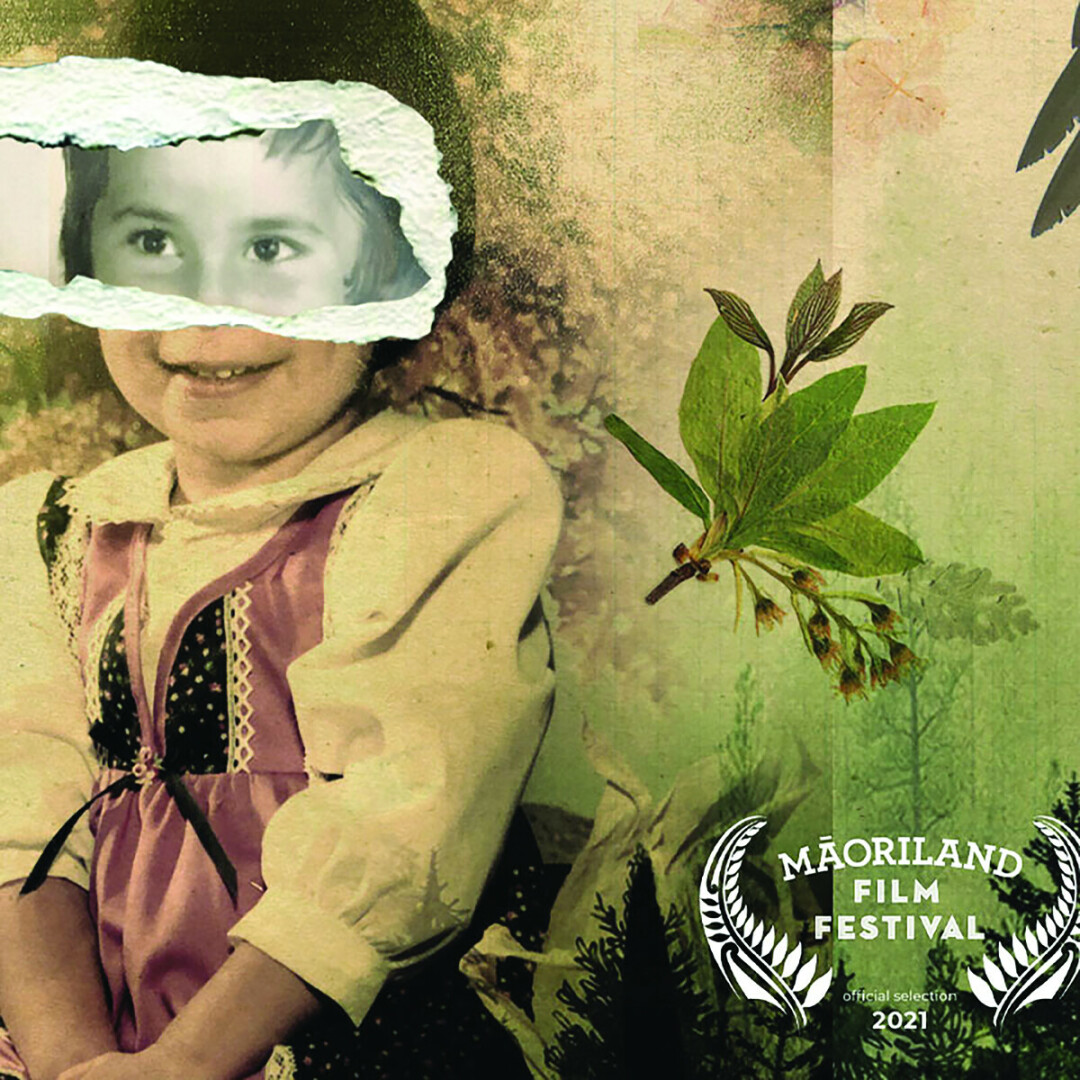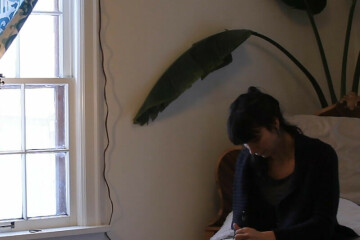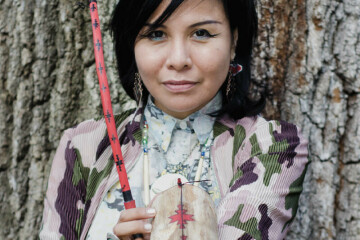Tinworks Art Spotlights The Stories Of Indigenous Women
Tinworks Art is a local non-profit organization located in Bozeman’s northeast neighborhood. Founded in 2018, the group has quickly gained momentum in the art scene, providing welcoming and immersive art experiences each summer in venues ranging from the historic Rialto theatre in downtown Bozeman, to the old Story Mill grain terminal off Bridger Drive.
Earlier this year, Tinworks Art announced their new permanent home at the site of their namesake, the same place where they held pop-up exhibitions in 2019 and 2020 — the former Tin Works Inc. metal fabrication buildings at 719 N. Ida. Having a permanent space will allow Tinworks Art, now in their fifth season, to expand and diversify their exhibitions of local and visiting artists, maintain a safe space for creation and display of art works, and provide an accessible place for community to come together to experience culture.
A Full Calendar For Summer 2022
Echoing the group’s transition back into a defunct industrial space, this year’s Tinworks Art program Montana: Culture Industry showcases artists and events unencumbered by nostalgic or mythic images of the West, rejecting the idea that the fine arts are separate from the industrial arts.
Tinworks Art Consulting Curator, Dr. Melissa Ragain and Consulting Assistant Curator, Dr. Jennifer Woodcock Medicine-Horse, selected the 2022 artists and designers for their scrappiness, entrepreneurialism, and socially-conscious practices. The program features both local and visiting artists, with an emphasis on Indigenous art and culture. Each event will take place in or around the warehouses at 719 N. Ida.
The summer begins with a grand opening and mural unveiling by Louis Still Smoking on July 8th, followed by a Native Fashion show by Gina Still Smoking on July 9th. Events will take place throughout the summer, with a powerfully rich, poignant, and lively weekend on July 22 and 23, devoted to the theme of Native adoption.
A Weekend Not To Miss
In a rare opportunity for the Bozeman community, Tinworks Art will host a film screening of Daughter of a Lost Bird (DOLB), directed by Brooke Pepion Swaney (Blackfeet/Salish). The 66-minute film will be followed by a panel discussion with the cast and crew, including Swaney; lead and producer Kendra Mylnechuk Potter (Lummi); and the film’s composer, Laura Ortman (White Mountain Apache).
On Saturday morning, the conversation will continue in an open writing workshop on origin stories by Potter. A lively and vibrant rock and roll performance by Ortman that afternoon will complete the weekend. Each event is free, but tickets are required. Visit tinworksart.org for details.
Daughter of a Lost Bird
Daughter of a Lost Bird follows Kendra, an adult Native adoptee, as she reconnects with her birth family, discovers her Lummi heritage, and confronts issues of her own identity. Her singular story echoes many affected by the Indian Child Welfare Act and the Indian Adoption Project.
The film explores the gray areas of ethics surrounding transracial adoption, specifically Native American adoption, via a singular story as an entry point into a more complicated national issue. In many ways, Kendra Potter is a perfect example of cultural assimilation, a modern representation of the painful phrase, “Kill the Indian, save the man.” She is a thriving woman who grew up in a loving, upper middle-class white family, and feels no significant loss with the absence of Native American culture or family in her life. And yet, as a Blackfeet/Salish woman, director Brooke Swaney could not imagine that Kendra could be content or complete without understanding her heritage. So together they embark on a seven-year journey.
The film documents Kendra on her journey to reconnect with her birth-mother, April, also a Native adoptee. After 34 years apart, Kendra finds her biological mother, and they meet face-to-face in Portland, Oregon, after which Kendra returns to her Native homelands. Through Kendra and April’s unique experiences of growing up without knowledge of their heritage or tribal affiliation, viewers learn, along with the women, of their inherited cultural trauma, as well as of the beauty of the Lummi ways neither knew while growing up.
The Untold Story
The history of transracial Native adoption in the U.S. is a relatively untold story. Before the Indian Child Welfare Act (ICWA), large numbers of Native children were being separated from their parents—one in every 3-4 Native children (25%–35%) were being removed; of these, 85% were placed outside of their families and communities — even when fit and willing relatives were available. In foster care today, Native children in states with higher Native populations are overrepresented in the system. It seems like almost every Native family has been touched by adoption and/or foster care in some way or another.
Most Americans think of Indigenous people as an ethnic or racial minority, but they are not. As members of federally recognized tribes and communities, Indigenous people have dual citizenship. Thus, they are embroiled in questions of belonging. Native people, one of the only pedigreed people in the world, experience this acutely.*
Descended From Musicians
While the film’s composer, Laura Ortman, is White Mountain Apache, she was also raised outside of her community by a family of musicians. She took up the violin at a young age to be closer to her grandmother. In the years since, she has performed at The Whitney Museum of American Art, The Guggenheim Museum, and The Museum of Modern Art in New York. An inquisitive and exquisite violinist, Ortman is versed in Apache violin, piano, electric guitar, keyboards, and pedal steel guitar, often sings through a megaphone, and is a producer of capacious field recordings. Laura will participate in the film panel and deliver her own evening performance in the beloved “Asterisms” room at Tinworks Art. Laura works out of her New York studio in Greenpoint, and her apartment, affectionately named the Dust Dive.
JOIN US!
The weekend—and summer—of Tinworks Art will have something for everyone: young and old; introverted and extroverted; listeners and observers. You won’t want to miss it. For further details, visit tinworks.org.
*This information on Native Adoption is from research by the creators of Daughter of a Lost Bird.
Tinworks Art is a nonprofit based in Bozeman’s northeast neighborhood. They seek to enrich the cultural and social fabric of greater Bozeman by supporting inclusive, immersive contemporary art experiences for artists and audiences in non-traditional spaces. Melissa Ragain is the consulting curator for 2022’s program, Montana: Cultural Industry.





